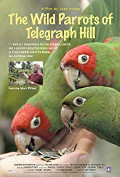
Directed by
Judy Irving
83 minutes
Rated G
Reviewed by
Sharon Hurst

The Wild Parrots Of Telegraph Hill
Synopsis: This is the true story of Mark Bittner, an aspiring writer, poet and musician who, after "failing" at all he tried, ends up living like a squatter in a ramshackle cottage on San Francisco Hill. As he seeks for spirituality and the meaning of life he befriends a flock of wild parrots and in his relationship with them finds many of the answers he has been seeking.You don't have to be a bird buff to get a real thrill out of this charming, and at times insightful documentary. The film works on two levels - one is the surface level story of Mark and all the individual birds he names and gets to know as friends. These are cherry-headed conures, gorgeous looking parrots with such a range of personalities as to be almost human (urban legends abound as to how the birds came to be there). We meet Mingus, a bird who simply refuses to stay out of Mark's house but has a Jekyll and Hyde personality. Sophie and Picasso both have crippled legs and Mark loves to create fantasies about their "love affair". Then there is poor old Connor, smitten by loneliness and rejection, since he is a blue-headed conure in the midst of the cherry headed flock. Mark says Connor is cranky because he doesn't have a mate, but observes also how Connor always comes to the aid of any birds who are either sick or under attack. And so we are unobtrusively lured into the world of the birds and their individual little dramas. It's very easy to surrender oneself to Mark's gentle world.
The other level is more metaphorical - Mark, himself an unwanted loner, looks after this flock of birds who really don't belong in San Francisco. And in turn, through caring for these creatures he has forged a bond and found a meaning to his life that always eluded him in his prior futile searchings for it. The sort of emotions he reads into the birds is, of course, always a thinly veiled reflection of human experience, with Mark, being a bit of a "retro hippie", philosophising that in a zen sense, all life is part of the one whole. He claims however that, rather than anthropomorphising the birds, humans have done way too much anthropocentrising of the world over the years - an interesting and valuable point to contemplate.
Filmmaker Irving has made award-winning documentaries and TV wildlife series, and she brings a firm hand to the direction of this one. The opening shots are of perplexed and fascinated tourists talking to Mark as he is surrounded and sat upon by the parrots. She then quickly cuts to the chase with scenes inside Mark's house of him playing music to the birds who enjoy a bit of a dance. It is only gradually and unobtrusively that the philosophical underbelly of the film reveals itself, and by then we are caught!
Despite the slightness of the subject matter, there is sadness, romance, tension, thrills and a surprise ending. Who'd have thought to get all of that out of a film that seemed to be just one for the birds!

Want more about this film?


Want something different?




